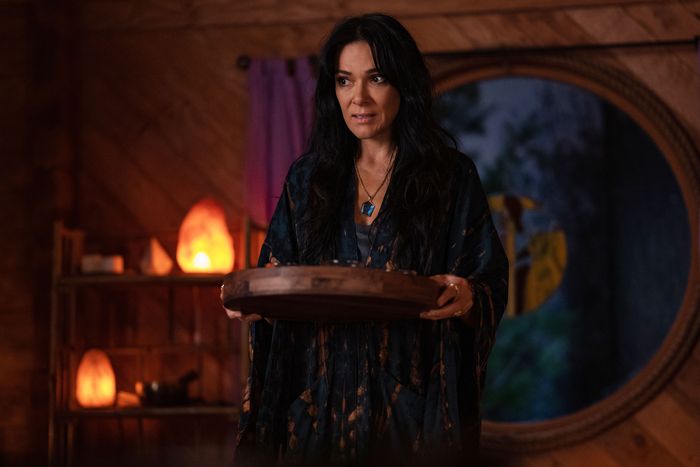
Spoilers follow for Yellowjackets season two, episode eight, “It Chooses.”
What initially set Yellowjackets apart from Lost were the passengers: a high-school girls’ varsity soccer team, trapped in the Canadian wilderness after a plane crash on their way to nationals. They were dealing with life-or-death threats, from storms to starvation, but they were also still teenagers with complicated internal hierarchies and anxieties that didn’t suddenly disappear in the face of more pressing matters. Yellowjackets was always about that juxtaposition — as Natalie puts it in season one, “We’re about to starve to death in the wilderness and I’m sitting here crying about a boy. That’s so fucking stupid.”
In its second season, especially the back half, Yellowjackets has proven that it’s still capable of delivering heartbreak, suspense, and horror; penultimate episode “It Chooses” is a particularly thrilling culmination, featuring the survivors’ first ritualistic human hunt in the wilderness and a cathartic deck-clearing roundtable in the present day. And yet it feels like there’s something missing. This stems in part from the choice to keep most of the adults apart for the majority of their scenes, but that wouldn’t be as much of an issue if the characterization were consistently strong. In fact, the root of the problem lies with one character in particular: Lottie Matthews.
From the beginning of the series, Lottie has been an outlier in a cast of vibrant, complicated characters. That has nothing to do with Courtney Eaton, who seems just as capable as Sophie Nélisse, Jasmin Savoy Brown, or any of the other talented performers in the younger cast. It comes down to a certain opaque quality that none of the other girls share. Too often, Lottie is merely a vehicle for mystery, with little of the interiority and sense of humor we see in the characters who get to regularly chat and relate to each other on a grounded, human level.
It’s telling that compared to every other main character, we still know very little about what Lottie was like in high school. Was she popular? Did she have crushes? Is she heterosexual, for that matter? Did she have any particularly close friendships on the team besides Laura Lee (and were they even close before the crash)? What really is her personality, besides quiet and magnetically cryptic? The pilot episode established that her dad paid for the private plane, apparently his “only form of parenting,” but we otherwise never hear about her family outside of seeing them arranging treatments for her schizophrenia. Indeed, Lottie’s diagnosis often feels like her whole character, despite the show’s reticence to address it head-on. There have been so many missed opportunities to dig into how her unmedicated wilderness persona differs from her medicated persona pre-crash and post-rescue, and how that manifests in the greater hive dynamic. (Her teammates would surely trust her visions less if they knew this about her background, right?) Doubt is ostensibly a critical part of her character — in season one, she sought Laura Lee’s guidance in interpreting her withdrawal-induced hallucinations — but it has largely vanished outside of a few scenes.
It’s a shame, because Lottie is at her most relatable when questioning her faith, not being vindicated; see her hunting contest with Nat, when she offers a pointless blood sacrifice and almost freezes to death. Their later reconciliation also offers the rare occasion of Lottie joking around with a fellow teammate, like a flashback to some year-old scrimmage. The present-day Lottie gets some of these moments of vulnerability, too, as the resurgence of her visions makes her question whether she was ever really ill.
That would make for a fascinating internal struggle if we had the full context for it, or if the show were willing to openly acknowledge that the forest spirit the survivors worshipped was a coping mechanism to help them deal with trauma and guilt, not a real entity. (Yellowjackets excels when it does hint at this idea, as in Akilah’s conversation with Taissa about the comfort of arbitrary rituals.) But so much of Lottie’s characterization is wrapped up in the central ambiguity of whether there’s actually anything supernatural going on, which likely won’t be answered with any real conclusiveness for some time. It’s hard to define or understand her as a character until that mystery is solved; she’s hamstrung by the structure of this story, and the necessity to obscure the full truth in both timelines.
Season one handled these issues by doling out information at a satisfying pace. We suspected early on that Jackie would die, which was basically confirmed around the midpoint, and then the finale provided the final piece of the puzzle. By the end of the season, we knew both the circumstances of Jackie’s death and the reason Shauna was so haunted by it 25 years later. (The cannibalism in the first two episodes of this season offered further clarification.) And this season has accomplished something similar with the baby boy Shauna lost out there, a tragedy referenced to explain her tendency to keep her daughter at arm’s length; it even pays off with a moving scene in the latest episode when Jeff tells the story to Callie. But Lottie is less of a fleshed-out character than Shauna, with fewer compelling relationships. Even in the past two episodes, when the core six survivors come together and truly bond for the first time in a quarter-century, Lottie has the least to say. She’s still a stand-in for the show’s biggest mysteries — the slightly distant, polished leader who only really speaks up to preach about the spirit that followed them home.
The show’s unwillingness to clarify exactly how correct Lottie’s spiritual convictions are also prevents it from engaging with her relationship to her mental illness; it’s still ambiguous what even she thinks about her visions. That has never been a problem for Taissa, who’s going through her own struggle but always gets to vocalize her fears to Van, Shauna, and Lottie. We never get to see Lottie have an honest conversation about her diagnosis or history of being medicated with anyone besides her hallucinated psychiatrist. That denies us the chance to invest in her friendships and truly understand how she perceives herself.
Maybe Lottie never grants herself the opportunity to get real because it would tarnish the image of an all-knowing spiritual guru in the eyes of her devotees, in either timeline. After all, in the wilderness their survival potentially depends on buying what Lottie is selling. But that just comes back to the problem: At this point, Lottie is still more of a narrative function than a character. We may understand her reasons for submitting to Shauna’s brutal beatdown in theory — to provide an outlet for her grief — but there’s no real sense of the person who would make that decision. Even a brief glimpse of Lottie’s natural reluctance would be appreciated, but her consistent embrace of spiritual logic makes her concrete choices feel weightless and easy. Season one might have used this scene to break down the implications for Shauna and Lottie’s dynamic, but “It Chooses” neglects to explore any potential interpersonal consequences between them.
Regardless of intent, Lottie’s character hews uncomfortably close to the overused trope of the mystical disabled person: We never hear her perspective on anything other than the wilderness or her illness, with little suggestion of a deeper inner life. That could remain a problem as this show goes forward, even assuming the finale wraps up the season satisfyingly. After all, Lottie is now Yellowjackets’ central character in many ways; this year’s wilderness story was structured around her rise to spiritual leadership, and the present-day narrative converges at her wellness center, where everyone will decide for the second time whether to follow her lead. Last season’s penultimate episode prepared us for this when we saw her stepping into the role of Antler Queen to lead a feral, shroom-fueled hunt for Travis, but she plays an even more significant role for the hunt in “It Chooses,” even though she’s incapacitated for it. After all, the girls are willing to sacrifice one of their own to protect her. They’re fully in her thrall now.
Considering her role in providing her teammates the rationale they need to hunt and kill each other, Lottie may be the most important character in all of Yellowjackets. But she’s also the most difficult to understand, which detracts from the poignancy her storyline could have. When you compare her plot relevance to anyone else, she easily wins — but in emotional resonance, she can’t compete with the devastating arc of Shauna and Jackie’s friendship, or Travis and Nat’s tragic love story, or even Misty’s various ill-fated friendships. Yellowjackets is most satiating when it’s specific and emotionally charged, but when it lingers too long in abstraction, it leaves us hungry.
More From This Series
- Yellowjackets Recap: The Bridge Home
- Yellowjackets Recap: Serious Karma Deficit
- Yellowjackets Recap: Girls’ Trip


